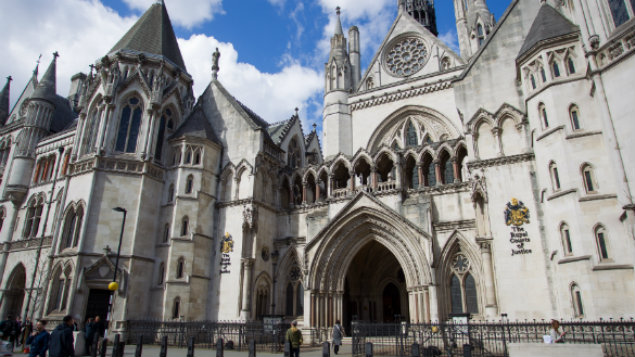
Royal Courts of Justice. Photo: REX/Shutterstock.
A black barrister was yesterday (23 September) stopped and mistaken for a defendant several times in one day at her court workplace.
Alexandra Wilson revealed on Twitter that firstly, a security guard had stopped her entering the building and said he needed to look up her name on the list of defendants. “I tried to shrug [this] off as an innocent mistake,” said Wilson, who specialises in criminal and family cases.
After clarifying her identity as a barrister, Wilson was admitted and went to see a prosecutor in a courtroom. At this point a member of the public told her not to enter, in the apparent belief she was a journalist. An usher intervened and told Wilson to go ahead and ignore the individual. At this point a solicitor or barrister asked her to leave the room and wait to be signed in by the usher. Wilson explained she was a barrister, to her colleague’s embarrassment.
Finally, the court clerk, unaware of Wilson’s identity, loudly asked her to leave the courtroom and asked whether she was represented.
On being informed of Wilson’s status, the clerk said “oh right, OK.”
I thought I’d explain what happened today because I’m absolutely exhausted and tbh I think a light needs to be shone on this. Especially given so many people like me seem to experience the same thing.
— Alexandra Wilson (@EssexBarrister) September 23, 2020
Wilson said: “I don’t expect to have to continually justify my existence at work.”
Still on Twitter, a QC, James Turner, responded: “Perhaps you should have asked her in terms why on earth she’d thought you were a defendant. It might have given her cause for some insightful self-analysis.”
The acting chief executive of HM Courts and Tribunals Service, Kevin Sadler, has promised to investigate Wilson’s complaint.
He replied to Wilson on Twitter: “I‘m very sorry about your experience at court yesterday – it is totally unacceptable behaviour and I’m investigating the role of my staff and contractors as a matter of urgency. This is not the behaviour anyone should expect and certainly does not reflect our values.”
Amanda Pinto QC, chair of the Bar Council, told the Guardian that the incident was “appalling”. She said: “With regret, I fear Alexandra’s experience is not a one-off. Many barristers have to put up with the prejudiced assumptions of others – Alexandra has done so with exemplary grace and patience. I am speaking directly with HMCTS, the senior judiciary and the CPS [Crown Prosecution Service] immediately, urging more to be done to stamp out this behaviour.
“The barristers’ profession is always striving to be more representative of the society it serves. There is more to do to change the perception of the bar, but that is no excuse for the kind of attitudes and remarks described. We are not all white, middle-class men.”
The incident comes on the heels of official figures revealing that people from black, Asian and minority ethnic backgrounds are less likely to be successful when applying to become a judge, and only 9% are senior barristers.
Last week a Ministry of Justice report found BAME people accounted for 8% of court judges and 12% of tribunal judges identified as of1 April 2020, an increase of 2 percentage points compared with 2014 in both cases. The report said “there is no clear pattern by seniority, though the proportion BAME is lower for senior court appointments (4% BAME for High Court and above) compared with others.
The report stated: “The proportion of judges who identify as Black, Asian and minority ethnic (BAME) has also [in addition to women] increased in recent years, but remains lower for court appointments compared to tribunals, particularly at senior levels (4% for High Court and above, compared with 8% of all court and 12% of all tribunal judges). However, the association between age and ethnicity – with lower a proportion of BAME individuals at older ages, and more senior judges being older on average – should be borne in mind.”
In August civil liberties solicitor Marcia Willis Stewart QC, who represents many Grenfell families and previously Hillsborough survivors, raised the issue of racial stereotypes in the law, observing that black lawyers can still be mistaken for defendants. She said that while representing of the family of Mark Duggan, who was shot dead by police in north London in 2011, she had been assumed to be the dead man’s mother on occasion. She said:
“And whilst I would not have had a problem being Mark Duggan’s mother, she was right next to me and she was not identified.
“It was really about blackness and the kind of stereotypes around a black son being shot and so he must have a black mother and all of those things. It is not straightforward.”
Latest HR job opportunities on Personnel Today
Browse more human resources jobs
tinyurlis.gdv.gdv.htu.nuclck.ruulvis.netshrtco.detny.im
مقالات مشابه
- SHA warns of possible COVID-19 exposure at Saskatoon gym
- انگلیسی رواج ویرایشگر نژادی برفلد در محل کار خود را
- اینستاگرامم در مورد مواد شیمیایی چه چیزی می تواند به شما آموزش
- Cart manufacturer CEO testifies at Saskatoon workplace fatality trial
- Why Is Women’s Leadership Not in the Headlines?
- Moose Jaw ساکنان تشویق به گرد هم می آیند برای حمایت از Snowbirds به عنوان آنها می رسند در شهر دوشنبه
- کربن فعال تجهیز یار
- چگونه با استفاده از اسباب بازی 1,000,000 دلار به دست آوریم
- باربری اثاث کشی بلوار تعاون
- کارفرمایان می تواند کمک به جلوگیری از شلوغ رفت و آمد